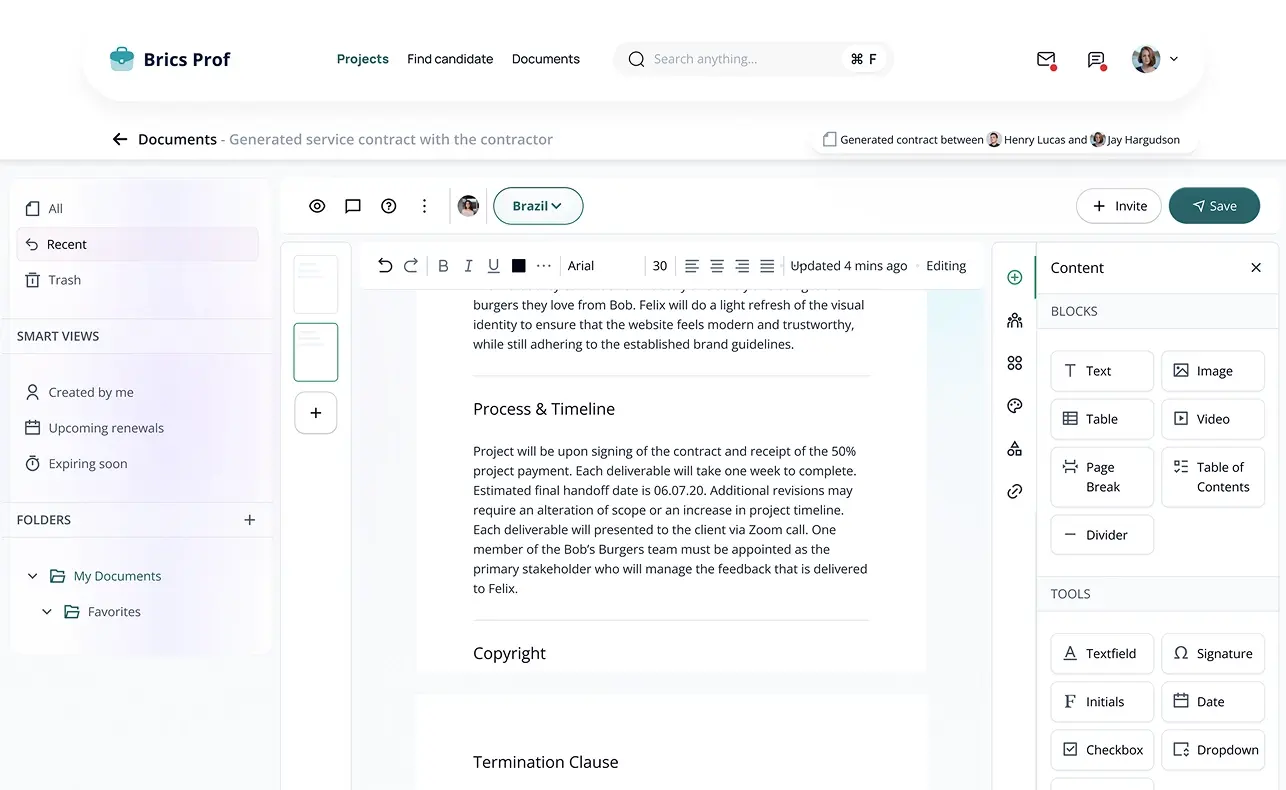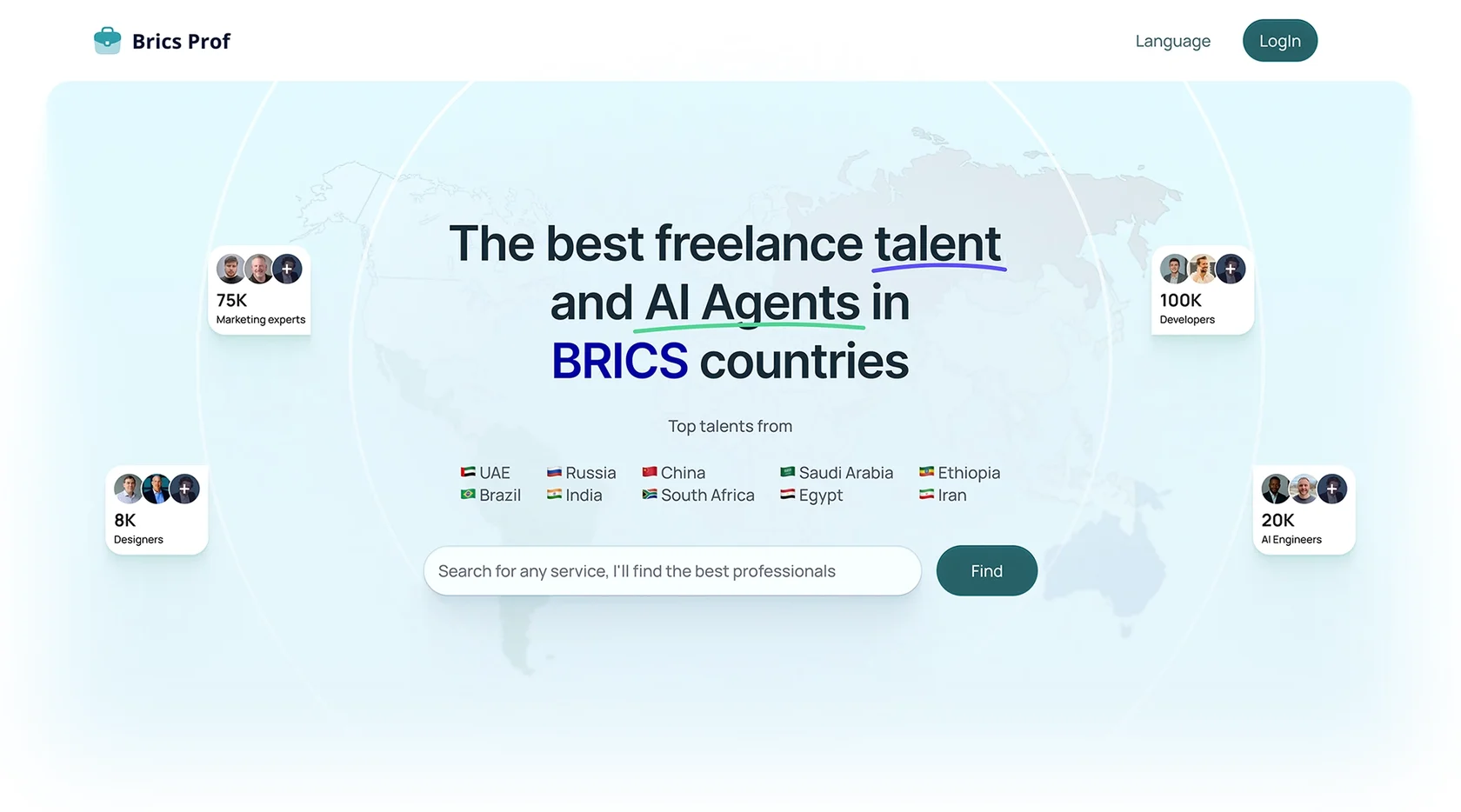International Employment Platform for BRICS Countries











Unified system for cross-border payments in local currencies
About the Project
A technological and organizational solution — a platform that allows organizations to conveniently and securely work with foreign qualified specialists in a remote format.
The project was initiated by an order from the President of the Russian Federation.
Access to specialists registered on local freelance platforms from different BRICS countries
Compliance with legislative norms in civil legal relations, personal data, and intellectual property
AI assistants for cultural communication adaptation
Organization of secure data exchange when providing services
Synchronous translation of messages, documents, video calls
About the Project
A technological and organizational solution — a platform that allows organizations to conveniently and securely work with foreign qualified specialists in a remote format.
The project was initiated by an order from the President of the Russian Federation.
- Unified system for cross-border payments in local currencies
- Access to specialists registered on local freelance platforms from different BRICS countries
- Compliance with legislative norms in civil legal relations, personal data, and intellectual property
- AI assistants for cultural communication adaptation
- Organization of secure data exchange when providing services
- Synchronous translation of messages, documents, video calls

Top professionals and clients from BRICS countries on one platform
Search without cultural barriers, in any language, with a convenient and unique recommendation system
Profile Search
Find professionals in your language, with interpreted experience and education, considering cultural nuances to recommend the best candidates for your project.
AI Enhancements
AI-powered improvements to your project description help sharpen the wording and increase response quality from professionals.
Contract Templates
Verified contract templates in multiple languages for a fast and secure start between parties from different BRICS countries.
Any Language
Communicate in your native language with precise translations that analyze context and cultural nuances — ensuring true understanding across countries.
Contract Signing
You can create contracts, collaborate on them, manage, and sign electronically — all on a single platform. No need to switch between apps.
You can create contracts, collaborate on them, manage, and sign electronically — all on a single platform. No need to switch between apps.
Contract Signing


Communicate in your native language with precise translations that analyze context and cultural nuances — ensuring true understanding across countries.
Any Language

Verified contract templates in multiple languages for a fast and secure start between parties from different BRICS countries.
Contract Templates

AI-powered improvements to your project description help sharpen the wording and increase response quality from professionals.
AI Enhancements

Find professionals in your language, with interpreted experience and education, considering cultural nuances to recommend the best candidates for your project.
Profile Search

Search without cultural barriers, in any language, with a convenient and unique recommendation system
Top professionals and clients from BRICS countries on one platform
Enhance the demand and success of your graduates in new markets
Universities
Solve problems of personnel shortages or surpluses in your region
Government Institutions
Work with leading foreign companies while continuing to live in your homeland
Specialists
Hire qualified foreign specialists from BRICS countries
Corporations
For whom
For whom
-
- Government InstitutionsSolve problems of personnel shortages or surpluses in your regionJoin the Project
-
-
Team
On behalf of the Russian Federation, the project is being implemented in cooperation with the Ministry of Labor of the Russian Federation, the Agency for Strategic Initiatives, and the "Professionals 4.0" platform
Join the Project

News
FAQ
The main goal of the platform is to connect qualified specialists from BRICS countries with companies in need of talent. This is an initiative aimed at leveraging the extensive and diverse labor resources of BRICS countries to eliminate labor shortages and stimulate economic growth.
The platform aims to address several critical issues:
- Labor Market Imbalance in BRICS: Some BRICS countries experience a shortage of qualified specialists, while others have high unemployment levels. The platform helps bridge this gap through cross-border employment.
- "Virtual Brain Drain": Talented specialists from BRICS countries often seek remote work on Western platforms, leading to a loss of expertise in their own economies. The platform offers an alternative, preserving talents within the BRICS ecosystem.
- Legal and Regulatory Barriers: Differences in labor legislation, tax systems, and regulations between BRICS countries can be complex. The platform provides a standardized base and support to simplify these processes.
- Cultural and Language Differences: Language barriers and differences in work cultures complicate effective collaboration. The platform will offer translation services and promote intercultural understanding.
Financial transaction security will be ensured through:
- Collaboration with recognized financial institutions approved by BRICS countries.
- Integration with leading payment systems for fast and transparent transactions.
- Ability to contract in local currency to reduce currency risks.
- Multiple payment processing solutions to enhance reliability.
To protect user data, the platform will use:
- Data encryption during transmission and storage.
- Multi-factor authentication to protect accounts.
- Secure virtual rooms to prevent unauthorized access.
- Compliance with data protection laws of each BRICS country.
- Threat monitoring to identify potential cybersecurity risks.
To remove barriers, the platform will offer:
- Multilingual interface allowing users to interact in their preferred language.
- AI-powered instant translation tools.
- Resources for enhancing intercultural understanding.
- Short intercultural communication training modules.
Trust will be strengthened through:
- Verification of employers and performers using detailed data checks.
- Rating and review system to increase transparency.
- Quality control mechanisms to ensure service standards.
- Insurance options protecting employers and performers from potential financial risks.
Platform goals include:
- Forming a more equitable global labor market by creating opportunities for specialists from developing economies.
- Minimizing "virtual brain drain" through competitive job offers within the BRICS region.
- Improving education and skill quality through experience exchange.
- Promoting sustainable development and economic integration of BRICS countries.
- Reducing social tensions by creating new job opportunities.
1.1 MB

2.9 МБ

0.6 MB

Documents
© BRICS Global Remote Employment Platform, 2025
Find a Specialist
Registration Form
Join the project
Discuss partnership
We use cookies
Customize cookies
Select the cookies you allow this site to use




